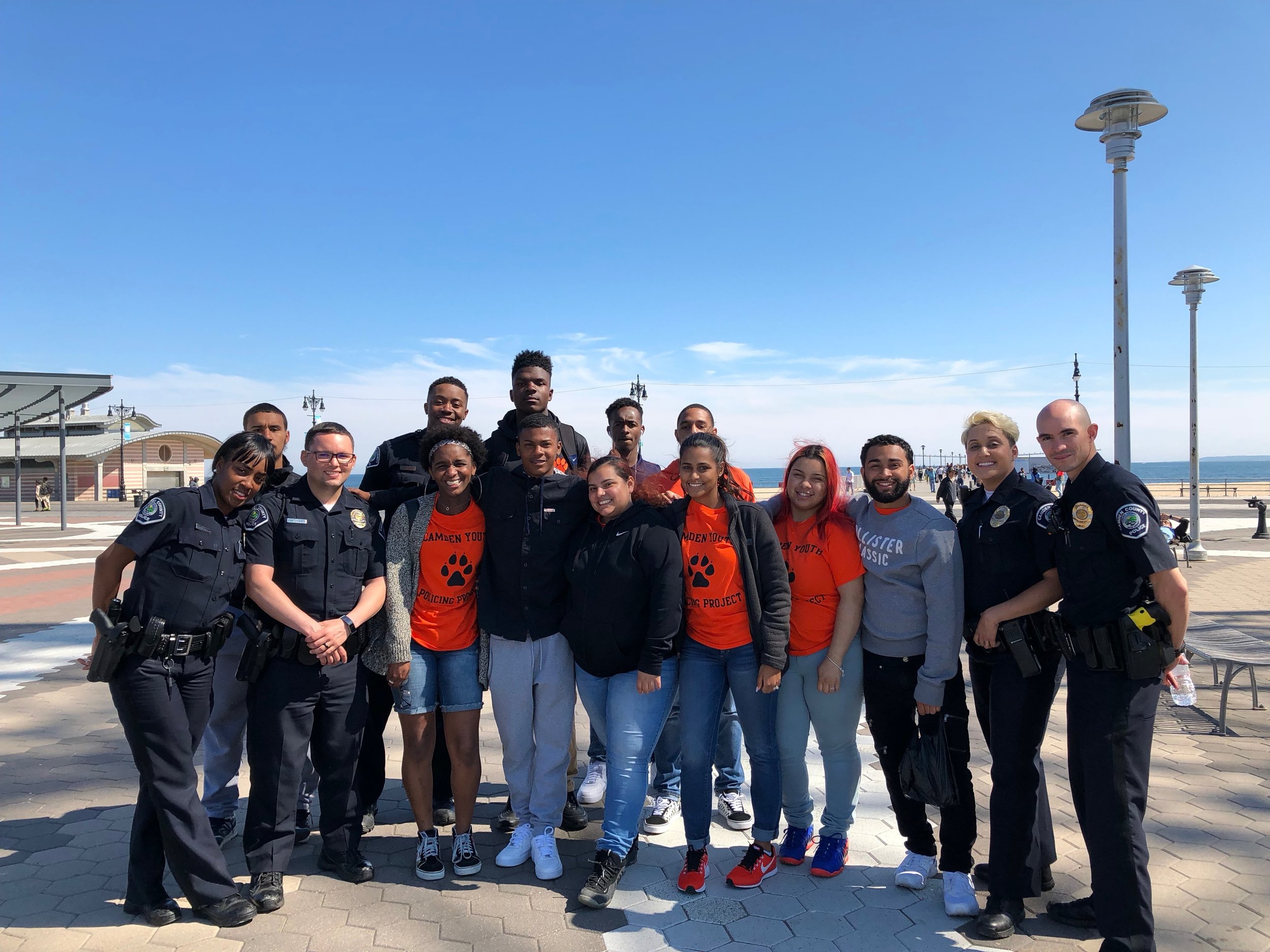Law enforcement and community leaders have long recognized improving engagement with juveniles can lead to overall stronger police-community relations and help youth resist peer pressure toward problematic behavior.
But true engagement requires giving young people a voice in shaping how their communities are policed —which is why we developed a program to bring together students and local police officers in a classroom setting to work collaboratively on community problems.
We began in 2016 with pilots of our Youth-Police Engagement Program in high schools in Camden, New Jersey and Tampa, Florida. With the continued support of the Camden County Police Department (CCPD), we worked with administrators from Woodrow Wilson High School in East Camden to launch an expanded, more robust version of the program at their school for the 2017-2018 school year.
Navigating a Tense Start (With a Little Help from Our Friends)
Our friends from the Junior Citizen Police Academy alumni shared their own empowering experiences engaging with police officers.
As we anticipated, the beginning of our program saw skepticism and tension between our two groups — particularly on the student side.
Students were blunt about their feelings towards cops, with reactions such as “I don’t like them” and “I’ll walk out of the room if they come in here.” They also expressed doubts that anyone would actually listen to their voices or that real change could result from their participation.
To help counter this skepticism, we called on the Junior Citizens Police Academy (JCPA) from Liberation High in Coney Island, Brooklyn. Alumni from the program came to Camden to discuss their experiences engaging with police officers. Our group immediately connected with the JCPA students as they shared their journey, and the experience helped the Camden students see what they might accomplish in our program.
Getting into a Groove
Our officers and students began the process of getting to know one another through icebreakers and interviews that asked “real questions” to get at the meaning of the interviewee’s experience. (Instead of: “Where did you grow up?” Ask: “How do you feel about where you grew up?”)
After building familiarity, we began our work on collaborative problem-solving. We brainstormed issues around policing in Camden from both youth and officers’ points of view, and narrowed down our focus to one issue that each side saw as the biggest problem facing the two groups: police-youth interactions in Camden lack respect.
As our group considered how the situation could improve, they observed that by talking with and listening to each other in our sessions, they were able to develop greater respect. Students and officers alike recognized that prior to this program, they had rarely, if ever, had the opportunity to build these types of relationships.
Learning outside the classroom
Students and officers enjoying the Coney Island Boardwalk.
After several months discussing policing issues in the classroom, we took fields trip to the Camden County Police Academy and to Brooklyn where we visited our friends at JCPA.
At the Police Academy, our students got a taste of life on patrol. The Academy training team guided students through various exercises adapted from police recruits’ actual training program. The trip provided an opportunity for the students and officers to bond outside the classroom and provided a deeper context for our classroom discussions around when and why officers use force.
For our second trip, we ventured a little farther from home to visit Brooklyn where our JCPA friends had arranged a day of activities with the NYPD. Our students got to try out the NYPD’s version of the MILO machine and tour Jamaica Bay from an NYPD boat.
Putting it all together
Our program wrapped up with a emphasis on collaborative problem-solving as we developed and proposed solutions to the problem we identified.
We spent the remaining sessions discussing ways we could build respect between more youth and police officers in Camden. Together, the group landed on a two-part solution:
Train officers on how to interact with youth (in part by having youth share their perspectives with new officers during their training); and
Expand youth-police programming that (like ours) provides meaningful and consistent opportunities — rather than one-off events — for youth and police to build relationships.
By creating more opportunities for youth and police to get to know each other and share their perspectives, our participants felt respect between each side would follow.
From the beginning, we promised our participants that if they were willing to try this experiment in youth-police engagement with us, they would be able to share their insight and recommendations with the Chief of Police in Camden, Scott Thomson, and other leaders who could implement their ideas.
On June 4, 2018, our group fulfilled that promise by giving an interactive and engaging presentation that summarized their hard work from the year and included recommendations for how CCPD and other students in Camden could benefit from their ideas. The audience included Woodrow Wilson administrators, parents, and Chief Thomson.
A grand finale
Our Camden Youth-Police Engagement Program participants celebrate with our staff and members of the Camden County Police Department, including Chief of Police Scott Thomson, after completing their final presentation.
This year’s group of students and officers in our Youth-Police Engagement Program proved that substantive, meaningful engagement between young people and police is possible even when initial skepticism is high. The officers in the program told us it changed how they approached youth when they were on patrol, and students told us they now believed there actually were good police officers on the streets of Camden.
While we may have been a small group, we believe the lessons we learned with and from each other will be helpful to many.




